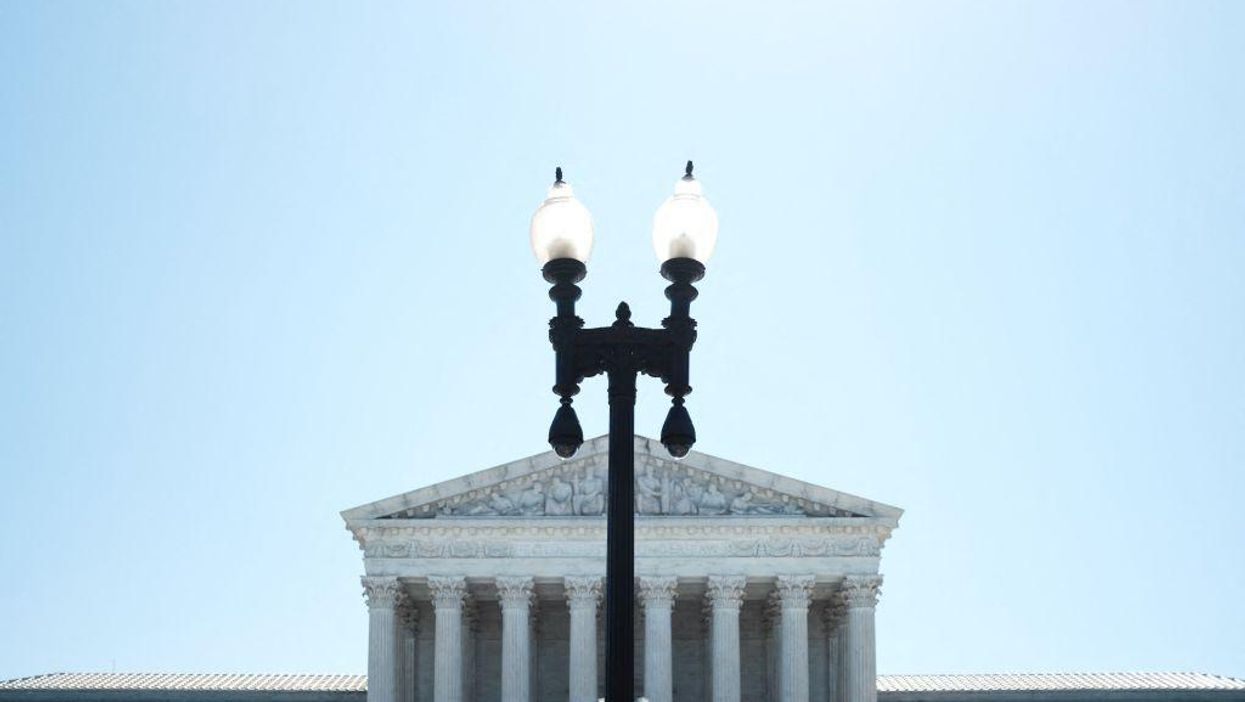
MANDEL NGAN/AFP via Getty Images

The U.S. Supreme Court on Thursday significantly curtailed the authority of the Environmental Protection Agency to regulate emissions from power plants, prompting Democrats to froth at the mouth because the court said Congress must act if lawmakers are concerned about climate change.
In a 6-3 decision in West Virginia v. Environmental Protection Agency, the court said that the EPA lacks broad authority to regulate greenhouse gas emissions from power plants under the Clean Air Act.
"Congress did not grant EPA ... the authority to devise emissions caps based on the generations shifting approach the Agency took in the Clean Power Plan," the court said.
The case concerned an Obama-era EPA regulation known as the Clean Power Plan, which created guidelines for states to limit carbon dioxide emissions from power plants, and its Trump-era replacement, known as the Affordable Clean Energy rule. The Trump administration repealed the Clean Power Plan after arguing it was illegal and introduced its own rule, known as the ACE rule, as a replacement. But some states and environmental groups sued, claiming Trump's rule did not go far enough and that the EPA had erred by issuing the ACE rule instead of following through with the Clean Power Plan.
The D.C. Circuit Court agreed with the challengers, vacating the ACE rule and sending the matter back to the EPA. But West Virginia and other states petitioned the Supreme Court to review the D.C. Circuit Court's opinion.
Writing for the majority, Chief Justice John Roberts held that the Obama-era Clean Power Plan was an "unprecedented" power grab by the EPA that "effected a 'fundamental revision of the statute, changing it from [one sort of] scheme of ... regulation' into an entirely different kind."
Roberts ruled that Congress had not intended to give the EPA the regulatory powers it was claiming and that the agency cannot force power plants to move away from fossil fuels and towards renewable resources without further legislation from Congress.
“A decision of such magnitude and consequence rests with Congress itself, or an agency acting pursuant to a clear delegation from that representative body,” he wrote.
The three liberal justices dissented. Justice Elena Kagan complained that the court's decision removes the power of the EPA to address "the most pressing environmental challenge of our time."
She criticized Congress for being too ignorant and lacking expertise to write sensible laws regulating the environment.
"Members of Congress often don't know enough — and know that they don't know enough — to regulate sensibly on an issue," Kagan wrote.
"Members of Congress often can't know enough — and again, know they can't — to keep regulatory schemes working across time," she added.
\u201cIn dissent, Justice Kagan is like: Congress sucks, so executive agencies have to be able to do this.\u201d— Gabriel Malor (@Gabriel Malor) 1656597802
Reacting to the decision, Democratic lawmakers were aghast that the court said they have to pass laws before the EPA can issue climate change regulations.
"Our planet is on fire, and this extremist Supreme Court has destroyed the federal government’s ability to fight back," Sen. Elizabeth Warren (D-Mass.) tweeted. "This radical Supreme Court is increasingly facing a legitimacy crisis, and we can't let them have the last word."
\u201cOur planet is on fire, and this extremist Supreme Court has destroyed the federal government\u2019s ability to fight back.\n \nThis radical Supreme Court is increasingly facing a legitimacy crisis, and we can't let them have the last word.\u201d— Elizabeth Warren (@Elizabeth Warren) 1656599584
House Rep. Alexandria Ocasio-Cortez (D-N.Y.), called Thursday's decision "catastrophic" and said the Senate needs to nuke the 60-vote filibuster threshold so Democrats can ram through climate laws.
"A filibuster carveout is not enough. We need to reform or do away with the whole thing, for the sake of the planet," she said.
\u201cCatastrophic. A filibuster carveout is not enough. We need to reform or do away with the whole thing, for the sake of the planet.\u201d— Alexandria Ocasio-Cortez (@Alexandria Ocasio-Cortez) 1656598004
Republicans, on the other hand, praised the court for reasserting that the legislative power resides with Congress, not executive branch agencies operated by unelected bureaucrats.
\u201cThis decision confirms Congress, not the EPA, has the authority to create environmental policy. We\u2019ll continue working to protect the environment while making American energy as clean, reliable and affordable as possible. \nhttps://t.co/dPtYYmD3mm\u201d— Sen. John Barrasso (@Sen. John Barrasso) 1656599632
"SCOTUS' decision today rightfully reins in unreasonable and unlawful attempts to shut down American power plants and energy production," Sen. John Barasso (R-Wyo.) said. "For years Democrats have used overreaching @EPA regulations to side-step Congress and the American people to enact their extreme climate agenda.
"This decision confirms Congress, not the EPA, has the authority to create environmental policy. We’ll continue working to protect the environment while making American energy as clean, reliable and affordable as possible," he added.